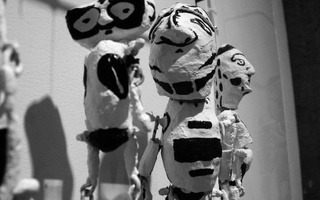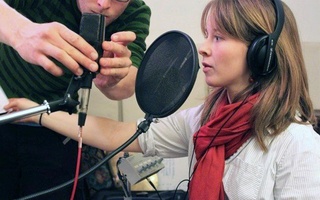Those who believe that Disney is the synonym for animated films have not met Visiting Lecturer in Animation Caroline Leaf '68.
In a career that has spanned from creating animation for MTV and "Mr. Roger's Neighborhood" to receiving an Academy Award nomination for her art film "The Street," Leaf says she thinks of animated films as a vehicle for self-expression and experimentation.
"My films aren't the usual animation stories," says Leaf, who, belying her soft-spoken demeanor, also hasn't followed a typical career path.
Specializing in short, 10-minute animated films, Leaf takes pride in her independent style.
"Each of my 10-minute animated films took about two years, doing everything from scratch. I haven't ever worked for anybody," she says.
In many ways, Leaf's career in animation has also been an ongoing work of experimentation.
Fittingly enough, Leaf's exposure to animation came about almost randomly. As an architectural sciences major at Radcliffe, she "thought it was a cool idea" to take a film course.
As it happened, she decided to take animation.
"I didn't know what animation was until I took the class [on animation] in the fall and spring of my senior year," Leaf says. "And then I traveled at loose ends in Europe for a year...I think I was a person without a plan."
Her former animated film professor, Derek Lamb, played a hand in bringing her back to the world of animation by suggesting that she return to Harvard to finish her first animated film that she had begun in his class.
"I was so glad, I didn't know what I would have done if I hadn't been called back," Leaf says.
In the fall of that year, she received the Loeb Fellowship to work on animation for a year.
Her first completed film in hand, she went on a cross-country drive with a former roommate. One of their stopovers was St. Louis, where they visited the home of a friend of her roommate's. As chance would have had it, the friend's husband owned a film company.
"He liked my work," Leaf says.
Emboldened, Leaf went back to Boston and rented an apartment near Radcliffe to pursue a career in animation.
"I slept in my living room and my bedroom became my camera room," Leaf says.
Leaf developed a recurring attachment to closed rooms in her work--unearthing freedom within a deceptively confined space.
"It's rather ironic, I love closed rooms because you can actually depict space and movement better that way."
Leaf says that many of her films--such as "Metamorphosis" and "Two Sisters" reflect her attachment to closed rooms.
"The Street"--the film that garnered her an Oscar nomination--focuses on a little boy who has been promised a small back bedroom and then must cope with a death in the family.
In 1972, Leaf moved to Canada to work for Canada's National Film Board--a government-supported art film production house. Leaf would make Montreal her base for the next 20 years.
"It was one big ugly building in the industrial outskirts of Montreal," Leaf says. "Everything was under one roof--cameramen, anything for sound, the laboratory that produced my films, all the editing, all the distribution."
But Leaf did not spend all her time in Montreal. For instance, her first film for the Film Board, the "Owl Who Married a Goose," was an adaptation of an Inuit legend.
"I got some trips out to the Arctic for that," Leaf says. "For my soundtrack I had some Eskimo women mimick animal sounds."
From 1980, under the auspices of National Film Board, Leaf also expanded to become a documentary director and scriptwriter.
Leaf traveled all over the world, from Israel to Nicaragua to the Soviet Union to Denmark to screen her works, give workshops and serve as a jury member for international animation festivals.
Leaf returned to Harvard two years ago to teach students how to create their own animation films. Looking at the world of animation, Leaf says that art animators have a hard but rewarding life.
"Canada seems to support the arts much better than the U.S.," she says. "The only other place [where the government supports animation] is Eastern Europe. Here, there are independent animators, but it's very hard. But people do it, it doesn't require expensive technology, just time."
Leaf says she likes teaching at Harvard because "the attitude here is to use the animation as a form of personal expression, which is how I've always viewed animation. It's not to give students a commercial job afterwards."
Looking at her life, she gives hope to the aspiring art animated filmmaker.
"It's not the greatest medium to find commercial work.... The jobs in commercial animation is not that great because you're a cog in the team," she said. "But if you find something here that you like and do well...then you're that much further in convincing someone out in the world that this is what they should hire you to do."
Read more in News
The Brave OneRecommended Articles
-
The Toys are Back in Town for Pixar's Latest"Zurg, you killed my mother!" screams an animated Buzz Lightyear as he battles the evil emperor on top of a
-
Cinemanic: PixarLike Andy in Toy Story, audiences have a choice: they can drop their $7.50 on the technologically advanced new kid
-
Director Brad Bird Soars Over Limits of AnimationCome Oscar time, nominations for The Incredibles, Disney and Pixar’s latest foray into the CGI world which they created, will
-
 A 'Frame by Frame' History
A 'Frame by Frame' History -
 Katharine Woodman-Maynard '08
Katharine Woodman-Maynard '08













